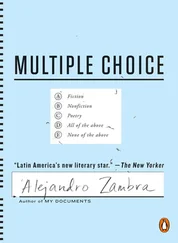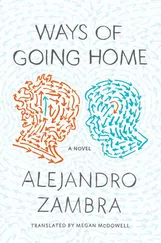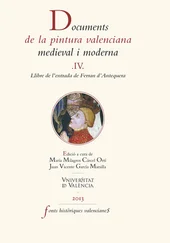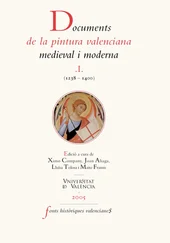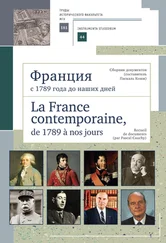Just like Max, she preferred to write by hand and later transfer her work to the computer. The documents she wrote were very long, and featured childish fonts and frequent transcription errors. They covered things related to cultural administration or politics or native rain forests, or something like that. It became necessary for her to do research on the Internet, and this was a big change; it led to the couple’s first fight, because Max still refused to use the Internet — he wanted nothing to do with web pages or antiviruses, but in the end he had to give in. Then one night there was a second furious argument: Max had been calling insistently for hours, but the line had been busy because Claudia was online. They bought a cell phone to solve the problem, but it was too expensive for their long conversations, and they had to get a second landline.
Before then, neither of them had really spent too much time on e-mail, but soon they both became addicts. Max’s greatest newfound addiction, however — one he would never kick — was pornography. This led to the couple’s third big argument, but also to several experiments, like the disconcerting — to Claudia, at least — ejaculations on the face, and Max’s obsession with anal sex, which provoked irate but ultimately beneficial discussions about the possible limits of pleasure.
It was around then that they lost the vowel a and the consonant t . It happened on a night when Claudia had to turn in an urgent report, so she tried to make do without those letters. Max, who once upon a time had attempted to write experimental poems, tried to help her, but it didn’t work out. The next day they bought a very good keyboard: it was black and had some flirtatious pink multimedia buttons that allowed you to play or stop music instantaneously, without having to resort to the mouse.
For some months, however, there had been portents of a greater disaster: dozens of inexplicable delays, some of them short and reversible, others so long they had to give in and restart the computer. It finally happened one rainy Saturday, which they should have spent calmly watching TV and eating sopaipillas or, in the worst of cases, moving the cooking pots and basins from one leaky spot to another; instead they had to devote the whole day to repairing the computer — or trying to repair it, more with willpower than any real, coordinated strategy.
On Sunday, Max called in a friend who was studying engineering. By the end of the afternoon, two bottles of pisco and five cans of Coca-Cola dominated the desk, but no one was drunk, they were just frustrated by the difficulty of the repair job, which Max’s friend attributed to “something very strange, something never before seen.” But maybe they really were drunk, or at least Max’s friend was, because all of a sudden, in one disastrous maneuver, he erased the hard drive.
“Well, you lost everything, but from now on it will work better,” said the friend, as if it were the most natural thing in the world, his coldness and fortitude worthy of a doctor who has just amputated a leg.
“It was your fault, you idiot,” said Claudia, sounding as if, out of pure negligence, one or maybe both of her legs had actually been cut off. Max kept quiet and hugged her protectively. The friend took one final and exaggerated gulp of his piscola , grabbed a few cubes of Gouda, and left.
Claudia had a hard time absorbing the loss, but she called in a real technician who changed the operating system and created separate profiles for both users, and even a symbolic third account, at Claudia’s request, for Sebastián, Max’s son. Yes, it’s true, he should have come up sooner — over two thousand words had to go by before he came into play — but the thing is that Max often forgot about the child’s existence: in recent years he’d seen him just once, and for only two days. Claudia had never even met him, because Sebastián lived in Temuco. It was hard for her to understand the situation, which had become, naturally, the black spot or the blind spot in her relationship with Max. It was better not to broach the subject, though it still came up every once in a while, in vicious arguments that ended with both of them crying, and of the two, it was he who cried the most — he sobbed with rage, with resentment, with shame, and then his face would harden as though the tears had settled like sediment onto his skin; it’s a commonplace analogy but really, after crying, his skin looked denser and darker.
It wasn’t all so terrible. When, with money from her parents, Claudia bought an amazing all-in-one device — it could print, scan, and even make photocopies — she threw herself passionately into digitizing extensive family albums. She would sit in front of the computer doing this for hours, and although the sessions seemed fairly tedious, she enjoyed them because she wasn’t just documenting the past, she was altering it: she distorted the faces of her more obnoxious relatives, she erased secondary characters and added in other, unlikely guests, like Jim Jarmusch (at her birthday party), or Leonard Cohen (beside Claudia taking her First Communion), or Sinéad O’Connor, Carlos Cabezas, and the congressman Fulvio Rossi (tagging along on a trip to San Pedro de Atacama). The editing wasn’t very good, but it got some laughs out of friends and cousins.
Another year passed like that.
Now Max worked the morning shift, so in theory they had more time together, but they wasted a good portion of that time arguing over the computer. He complained that because Claudia was on the computer so often, he wasn’t able to write when inspiration struck him, which was untrue, because he still used the same old notebooks for his endless drafts of poems (he felt that they were destroyed by the process of transcription). He had also gotten into the habit of writing endless e-mails to people he hadn’t seen in years, whom he now missed, or thought he missed. Some of these people lived nearby or not so far away, and Max had their phone numbers, but he preferred to write them letters — they were letters more than e-mails: melancholic texts, sensationalist, wistful, the kind of messages whose replies are put off indefinitely, although sometimes he received responses that were every bit as elaborate and contaminated by a frivolous, whining nostalgia.
Summer arrived and so did Sebastián, after months of delicate negotiations. They both went to Temuco to pick him up, by bus, nine hours there and almost ten back. The boy had just turned eight years old and the slight, premature shadow of a mustache gave him a comic, grown-up look. During his first days with them, Sebastián spoke little, especially if he was answering his father. Their intense trips to downtown Santiago, to the zoo, and to Fantasilandia all ended with them back at the apartment, and they seemed to have a better time shut inside on those hot afternoons than they did during the supposedly fun activities. Seba took advantage of his user profile, signing in to Messenger without restrictions for interminable chats with his Temucan friends. He quickly demonstrated his computer knowledge, which wasn’t surprising — like most children of his generation, he had learned about computers from a young age — but the extent of his dexterity impressed Claudia and Max. In a precise, slightly bored tone, the boy educated them about their choice of a new antivirus program and explained how they needed to defrag the hard drive periodically. He ran through the Pink Panther game with astonishing speed, it goes without saying, and the two or three afternoons he spent teaching his father and Claudia the logic of the game — so elementary for him — were the most glorious and full moments of his visit. He had certainly never been so close to his father, and he and Claudia became friends, so to speak. Claudia thought Sebastián was a good kid, and Sebastián thought Claudia was pretty.
Читать дальше

